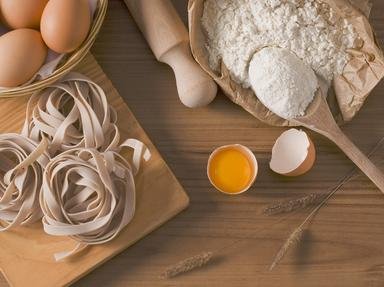Quiz Answer Key and Fun Facts
1. What natural sweetener is one of the basic ingredients of Lebkuchen, the spiced baked treat widely enjoyed in Germany at Christmastime?
2. Parkin is a traditional gingerbread cake of Northern England. What cereal product, a popular breakfast staple, does it contain?
3. Often baked in a distinctive, reversed S-shape, lussekatter are sweet saffron buns traditionally eaten in Sweden and Norway on which Christian saint's feast day, celebrated on 13 December?
4. Finnish people love to eat pulla (sweet buns) with coffee. Which fragrant spice, also found in Indian "masala chai" (spiced tea), is used to flavour these delicious treats?
5. An utterly scrumptious English sweet bun, made with a rich yeast dough spiced with cinnamon and rolled with currants, butter and brown sugar, is named after what historic London neighbourhood - known for its flower show and soccer team?
6. Pizzelle and buccellato are just two examples of Italian baked goods flavoured with which aromatic spice, which also scents the Greek liqueur ouzo?
7. Tsoureki, a traditional Greek sweet bread, is flavoured with mahleb, a unique spice made from the dried seed kernels of a species of wild cherry tree. For which religious festival - the most important in the Eastern Orthodox Church - is this bread baked?
8. The spiced cookies known as speculaas are not only good to eat, but also pretty to look at! In which European country are they traditionally made for Saint Nicholas' Day?
9. Poland's own version of gingerbread comes from the city of Torun, where it originated in the Middle Ages. What famous Polish musical icon was said to be very fond of this confection?
10. Pumpkin pie is a delectable dessert widely consumed in the US during the autumn and winter months, especially for Thanksgiving. Which of these spices would NOT be part of a typical pumpkin pie spice mix?
Source: Author
LadyNym
This quiz was reviewed by FunTrivia editor
jmorrow before going online.
Any errors found in FunTrivia content are routinely corrected through our feedback system.
